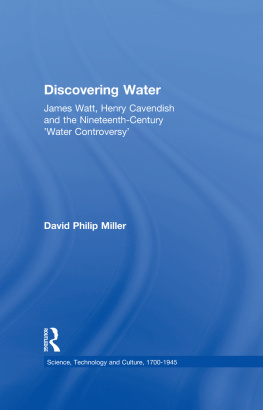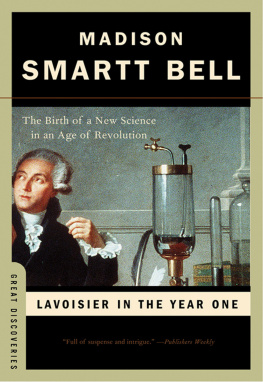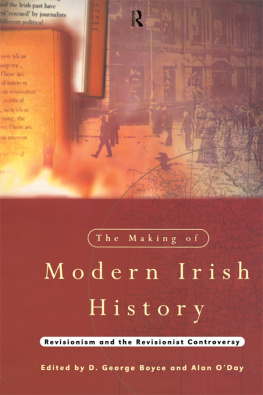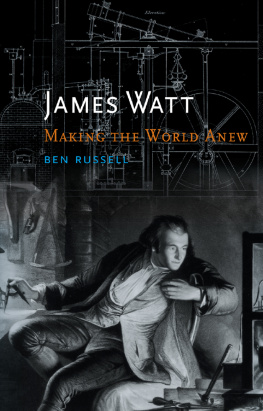The 'water controversy' concerns one of the central discoveries of modern science, that water is not an element but rather a compound. The allocation of priority in this discovery was contentious in the 1780s and has occupied a number of twentieth-century historians. The matter is tied up with the larger issues of the so-called Chemical Revolution of the late eighteenth century. A case can be made for James Watt or Henry Cavendish or Antoine Lavoisier as having priority in the discovery, depending upon precisely what the discovery is taken to consist in; however, neither the protagonists themselves in the 1780s nor modern historians qualify as those most fervently interested in the affair. In fact, the controversy attracted most attention in early Victorian Britain some fifty to seventy years after the actual work of Watt, Cavendish and Lavoisier.
The central historical question to which the book addresses itself is why the priority claims of long-dead natural philosophers so preoccupied a wide range of people in the later period. The answer to the question lies in understanding the enormous symbolic importance of James Watt and Henry Cavendish in nineteenth-century science and society. More than credit for a particular discovery was at stake here. When we examine the various agendas of the participants in the Victorian phase of the water controversy we find it driven by filial loyalty and nationalism but also, most importantly, by ideological struggles about the nature of science and its relation to technological invention and innovation in British society.
At a more general, theoretical, level this study also provides important insights into conceptions of the nature of discovery as they are debated by modern historians, philosophers and sociologists of science.
About the Author
David Philip Miller is Senior Lecturer, School of History and Philosophy of Science, University of New South Wales, Australia.
Science, Technology and Culture,
17001945
Series Editors
David M. Knight
University of Durham
and
Trevor H. Levere
University of Toronto
This new series focuses on the social, cultural, industrial and economic contexts of science and technology from the 'scientific revolution' up to the Second World War. Economic historians now cover the relations of science to technology and industrial application, while social and cultural historians have similarly recognized the realms of science and technology and, indeed, that these have helped to define culture and society. Through the agricultural and industrial revolutions of the eighteenth century, the coffee-house culture of the Enlightenment, the spread of museums, botanic gardens and expositions in the nineteenth century, to the Franco-Prussian War of 1870, seen as a victory for German science, this process has gathered momentum; while in the twentieth century the dependence of society, in both war and peace alike, on science and technology is evident. This series will provide an outlet for studies that address issues of the interaction of science, technology and culture in the period from 1700 to 1945, at the same time as including new research within the field of the history of science itself that embraces these perspectives
Also in this series
Hewett Cottrell Watson:
Victorian Plant Ecologist and Evolutionist
Frank N. Egerton
Chemical Structure, Spatial Arrangement:
The Early History of Stereochemistry, 18741914
Peter J. Ramberg
British University Observatories, c. 18201939
Roger Hutchins
Phrenology and the Origins of Victorian Scientific Naturalism
John van Wyhe
Science, Technology and Culture, 17001945
DISCOVERING WATER
For Margaret
Discovering Water
James Watt, Henry Cavendish and the
Nineteenth-Century Water Controversy
David Philip Miller
University of New South Wales, Australia
First published 2004 by Ashgate Publishing
Published 2016 by Routledge
2 Park Square, Milton Park, Abingdon, Oxon OX14 4RN
711 Third Avenue, New York, NY 10017, USA
Routledge is an imprint of the Taylor & Francis Group, an informa business
Copyright 2004 David Philip Miller
The author has asserted his moral right under the Copyright, Designs and Patents Act, 1988, to be identified as the author of this work.
All rights reserved. No part of this book may be reprinted or reproduced or utilised in any form or by any electronic, mechanical, or other means, now known or hereafter invented, including photocopying and recording, or in any information storage or retrieval system, without permission in writing from the publishers.
Notice:
Product or corporate names may be trademarks or registered trademarks, and are used only for identification and explanation without intent to infringe.
British Library Cataloguing in Publication Data
Miller, David Philip
Discovering water: James Watt, Henry Cavendish and the
nineteenth-century Water Controversy. (Science,
Technology and culture, 17001945)
1. Watt, James, 17361819Contributions in the chemical
analysis of water 2. Cavendish, Henry, 17311810
Contributions of the chemical analysis of water 3. Science
PhilosophyHistory19th century 4. Discoveries in
ScienceGreat BritainHistory18th century
5. Discoveries in scienceGreat BritainHistory19th
century 6. WaterComposition
I. Title
509.4109034
US Library of Congress Cataloging-in-Publication Data
Miller, David Philip.
Discovering water: James Watt, Henry Cavendish, and the nineteenth-centuryWater
Controversy/David Philip Miller.
p. cm. (Science, technology and culture, 17001945)
Includes bibliographical references and index (alk. paper).
1. WaterComposition. 2. Watt, James, 17361819. 3. Cavendish, Henry, 17311810
I. Title. II. Series.
QD142.M55 2003
546'22'09dc21
2003056077
ISBN 9780754631774 (hbk)
ISBN 9781138258457 (pbk)
Typeset by Manton Typesetters, Louth, Lincolnshire, UK
It must have been about 1963 that I blew myself up trying to make water. Being a nerd just as it was ceasing to be fashionable, I'd persuaded my father to buy me not just a chemistry set but a batch of high-class chemical apparatus from the local 'swap shop'. I'd read about hydrogen and how it burned in air with a blue flame to produce water. Synthesizing water appealed to me and I duly produced hydrogen, using zinc and sulphuric acid, in a small flask with a beautiful, delicate spout. After what I took to be a suitable interval to make sure that all air had been driven from the flask so that it was full of hydrogen, I struck a match and lit the emerging gas... The fact that I survived the explosion was quite remarkable, as the apparatus distributed itself to all corners of the room without any of it connecting with me. My schoolmasters subsequently advised that I should be a chemist. Fortunately I didn't listen to them and now, many years later, I find myself wrestling again with the composition of water but from a safe, historical point of view.
I was embarked all those years ago on a childhood journey of discovery, but I knew that I was not the discoverer. My chemistry books told me that. I had acquired a small library of the kind of texts you could find on the bottom shelf in second-hand book stores, some of which I still have, books by people with quaint-sounding names like Holmyard and Lowry. One of these was Lowry's Historical Introduction to Chemistry in the 1926 reprint. This, like many books of its genre and period, told me in no uncertain terms that 'Cavendish (1781) prepares water by burning inflammable air with common air'. I, like generations of schoolchildren, grew up knowing that this discovery belonged to, the mysteriously 'Honourable', Henry Cavendish.












